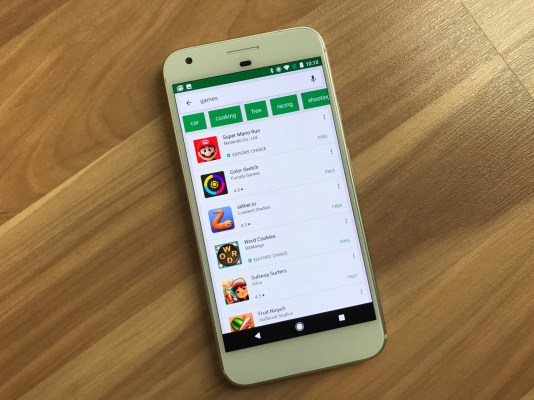Multiple reports this week claimed Google had quietly rolled out a more in-depth app review process to all developers — changes designed to keep the Play Store safer from spam, malware, and copycat apps. Those reports are inaccurate, Google tells TechCrunch. Instead, the company is giving itself more time to review apps from new, unestablished developers on the Play Store, as previously announced, but this hasn’t been extended to all developers.
Concerns about these so-called “unannounced changes” stemmed from a blog post by Choice of Games, which wrote that “all new apps” would be getting an additional review, slowing down app approvals. It claimed new apps would require at least three days for review, and this now included existing developers.
The post cited a conversation with Google Support as the source for its claims.
This led to a ton of confusion, as the development shop behind the post was well-established, having been on the Play Store since 2010 as would have been exempt from Google’s policy of increased reviews for new developers.
As it turns out, it appears there was miscommunication between Google Play Store developer support and the developer, according to the chat transcript that was published. The support person, “Liz,” was alerting the developer to the new policy Google announced in April, which detailed increased review times for Play Store newcomers. She didn’t appear to understand that she was speaking with a developer who had published on Google Play for nearly a decade.
Android Police also picked up the news, writing that it Google had “quietly instigated a more involved review process that impacts every app and update.”
Reddit and Hacker News also weighed in. In addition to the reported changes, developers were concerned there was now no way to schedule new app releases through the Timed Publishing feature. (That’s also not true — developers can publish to a closed testing track, then used Timed Publishing to go live to the public.)
A Google Developer Relations team member stepped in to clear things up on Reddit, and we’ve confirmed with Google that his responses were accurate.
Google’s updated app review process, first announced in April, hasn’t changed.
At the time, Google said:
“We will soon be taking more time (days, not weeks) to review apps by developers that don’t yet have a track record with us. This will allow us to do more thorough checks before approving apps to go live in the store and will help us make even fewer inaccurate decisions on developer accounts.”
Google began notifying developers directly in the Play Console in June that new apps by developers without a track record will take a couple of days longer to review. Google says that, since this change, it’s already seen a meaningful increase in the number of harmful apps blocked by Play even before they are published.
It’s not clear why the developer relations support person miscommunicated this information to the developer in question, but it points to a training issue on Google’s part.
It’s also unclear why the established developer’s app was held up in app review, beyond it just being a mistake on Google’s part.
Unfortunately for Google, Play Store developers have come to expect a speedy review process so any delays feel like unnecessary friction.
Unlike Apple, which employs a large team to carefully review app submissions and make hard calls on controversial apps, Google has more heavily relied on automation over the years. The company disclosed in the past how it uses software to pre-analyze apps for viruses, malware, and other content and copyright violations.
That process doesn’t always work, though. Only days ago, dozens of Android apps disguised as harmless photo editors and games were discovered to actually be adware. This follows similar news from January, where 85 apps were found to contain adware. And in May, where adware was discovered in some 200 apps totaling 150+ million installs. And, news from last November, where malware was found across over a dozen apps with half a million installs. And so on.
While it would make sense for Google to increase its review of all apps, given its inability to address this problem, that was not the case here.
